Christmas is normally a time for family gatherings, but to those miles away from home like my friend and myself, Christmas is just another holiday. We spent the time in Heidelberg, a small city with plenty of medieval flair.
I have heard of Heidelberg a long time ago. To those of us in the field, it’s famous for its biomedical research; and whenever there’s someone from Heidelberg presenting a seminar, one will get a chance to see the same picturesque view of the city. Now I can finally see the real thing for myself!
We spent the first day (24 December) strolling along the Main Street of the Old Town and making ad-lib forays into the many adjoining laneways. It was so relaxing without the massive crowd of tourists; we could have a good look at the churches and medieval buildings, and take as many photos as we liked. Reaching the end of the street, we ventured uphill to the Heidelberg Castle, to enjoy the view of the city and walk through the many buildings of the castle. The castle actually suffered some damage from a civil war about 300 years ago, but fortunately did not become totally ruined thanks to the sturdy architecture. The later administrators of the castle decided just to leave it that way for the public and not to bother with the reconstruction. By the end of the day, I couldn’t help but to think that I’ve found myself in Austria or Switzerland instead of Germany. Perhaps it’s because the style of architecture, the castle on the hill and the view from there all reminded me somewhat of pretty Salzburg.
We also wanted to feel some Christmas atmosphere. My friend, out of the blue, decided to take me to a Christmas Eve service at a local church. At first, I still managed to enthuse myself in trying the Christmas carols in German. But it didn’t take me long to fall into a lull then a nap, having spent all my energy through the walking. It was a much better idea to leave the church and look for a hearty Christmas meal in the remaining few restaurants that still opened for business!
Our next day was filled with a little ‘academic theme’. We first paid a visit to the University of Heidelberg, and then walked along River Neckar (that runs through the city) to Philosophers’ Walk. We were hoping to have our minds enlightened after this ‘academic trip’. No guesses that, in fact, we were only there to enjoy ourselves and more marvellous views – perhaps that was the real philosophy behind the Walk … In that foggy afternoon, we could just see the Heidelberg Castle on the opposite side of the Neckar, hidden behind a veil of white. As we kept walking on the meandering track, we slowly entered the woods which took on a more mythical appearance in the fog. I could imagine how the ancient philosophers could spend their days there pondering the difficult questions of life, let their thoughts run as wild as the walking track, and become inspired by the surreal surroundings.
We have definitely chosen a good time to visit Heidelberg, to appreciate its character and beauty in the tranquil settings. I haven’t been on a trip during Christmas time for a long time, and it’s the first time ever for my friend to experience what a quiet Christmas is like. (Back in Hong Kong, there’s no rest on Christmas Day!) It’s indeed been a special trip for both of us.
聖誕節是一般人家共聚天倫的時候,不過對我和朋友這兩個遊子來說,祇是另一個假期,我們到充滿中世紀氣息的小城海德堡逛兩天。
海德堡的生物及醫學研究出色,我對此早有聽聞了,而每次有人從海德堡來作演講,少不了會展示同一張卻百看不慣的風景照,這次我終於可以比照一下了。
第一天(12月24日)我們沿着舊城區的大街閒逛,又到相連的小巷鑽鑽,沒有遊客人潮的街道真好,既可仔細欣賞各教堂及中世紀建築,又可隨心所欲拍照,輕鬆自在。走到大街盡頭,我們便踏山路走到海德堡城堡,俯瞰全市景色,又在城堡的建築物之間穿梭,其實城堡在三百年前左右遭一場內戰,部份地方損毀,但由於建築技術好,又未至全面摧殘,當局也讓其以新舊交集的面目見人。逛了一天後,我竟然覺得自已好像不是身處德國而是在奧地利或瑞士,大概是因為建築風格、山上有城堡及從城堡看到的風景跟薩爾斯堡有幾分像吧。
為了給自已製造點聖誕氣氛,朋友忽發雅興帶我去旁觀平安夜彌撒,初時我還有興緻用德文跟大伙唱唱詩,但跑了一天後,始終都是敵不了睡魔,後來中途離席,還是找家少數仍營業的餐廳,吃個聖誕餐比較實際!
翌日行程帶點「學術主題」,我們先到海德堡大學逛逛,然後沿Neckar河步行往哲學家徑登山,我們本想附庸風雅,仿效古時學者,在那兩處地方吸收書卷氣、做做學問,結果我們祇顧遊山玩水,欣賞風景,甚麼哲理都拋諸腦後了。那天大霧,從哲學家徑山上回望對岸山上的海德堡城堡,好像掛着厚的白簾,走進樹林時,山路蜿然,遊人更稀少,有種雲深不知處的感覺。以前的學者,是不是在那種飄渺的環境中,讓自已的思潮在林間奔馳,然後悟出不為一般人瞭解的道理?
在聖誕節遊海德堡,令我們在恬靜中份外領略到這個古城的氣息和特色。我很久沒有在聖誕時外遊,我的朋友更是一生人第一次過毫無繁囂的聖誕,感覺很是特別。

The view from my hotel room 酒店房間的窗景
The Old Town 舊城區
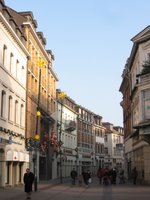
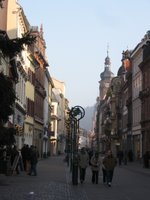
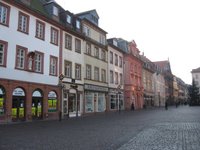
The Main Street at the start (top left), in the middle (top right) and towards the end (bottom left)
舊城區大街的開端(左上)、中段(右上)及未端(左下)

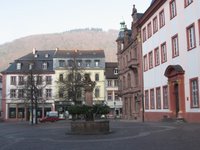
University Square 大學廣場
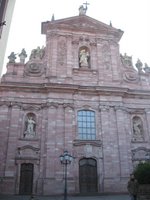
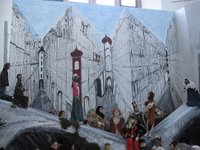
Jesuit Church 耶穌會教堂
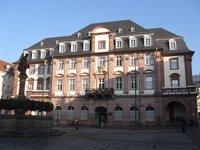
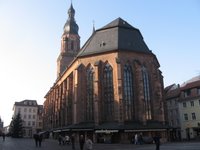
Town Hall Square 市政廳廣場
The Heidelberg Castle 海德堡城堡
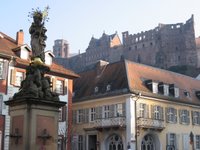
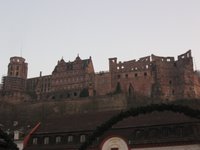
The view of the Castle from the Old Town 從舊城區仰望城堡
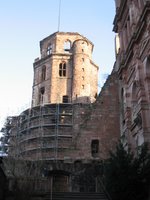
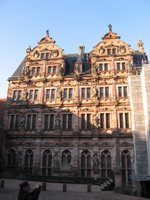

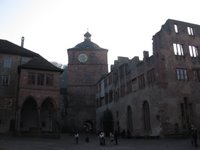
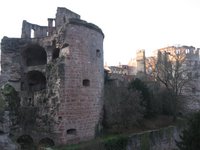

The buildings of the Castle 城堡內的建築物
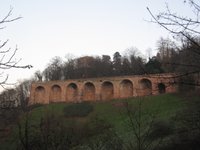

The terrace of the Castle (left), and the view of Heidelberg from the terrace (right)
城堡之大平臺(左),及從大平臺俯瞰海德堡之景色(右)
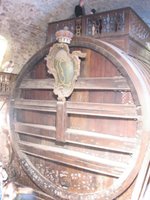
220000 litres of wine will satisfy even the thirstiest of all!
220000公升酒桶,保證令人不醉無歸!
Philosophers' Walk 哲學家徑
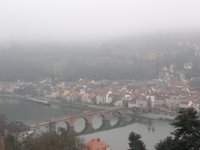
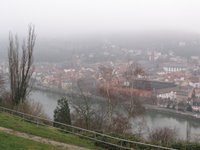
The view of the opposite side of Neckar
Neckar河對岸之景色
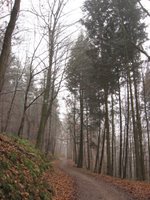
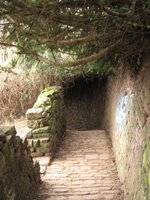
The tracks of Philosophers' Walk
哲學家徑的山路
Some more photos in the woods of the Walk can be found in this blog!
哲學家徑之其他山林景色,可見於此網誌:
http://geoffreykong.blogspot.com/2006_12_30_geoffreykong_archive.html
The Karl Theodore Bridge (Old Bridge) 城內舊橋
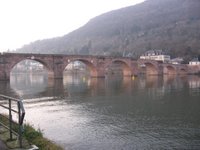
Almost perfect tranquility - very fitting for Christmas Day
波平如鏡的Neckar河,正好襯托聖誕的祥和氣氛

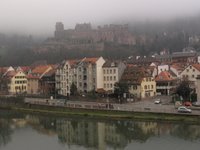
Views of the opposite banks of the Neckar from the bridge
從橋上看Neckar河兩岸的風景
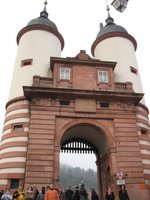
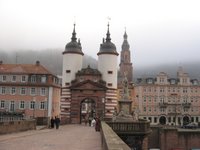
The gate of the bridge 橋門兩面觀

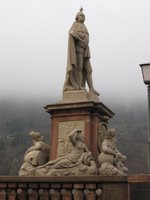
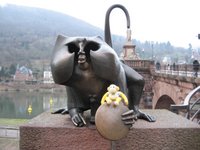 The statues and monuments of the bridge - but how did some monkey business get into it?
The statues and monuments of the bridge - but how did some monkey business get into it?
橋上的塑像,連小猴也來認親認戚!
I have heard of Heidelberg a long time ago. To those of us in the field, it’s famous for its biomedical research; and whenever there’s someone from Heidelberg presenting a seminar, one will get a chance to see the same picturesque view of the city. Now I can finally see the real thing for myself!
We spent the first day (24 December) strolling along the Main Street of the Old Town and making ad-lib forays into the many adjoining laneways. It was so relaxing without the massive crowd of tourists; we could have a good look at the churches and medieval buildings, and take as many photos as we liked. Reaching the end of the street, we ventured uphill to the Heidelberg Castle, to enjoy the view of the city and walk through the many buildings of the castle. The castle actually suffered some damage from a civil war about 300 years ago, but fortunately did not become totally ruined thanks to the sturdy architecture. The later administrators of the castle decided just to leave it that way for the public and not to bother with the reconstruction. By the end of the day, I couldn’t help but to think that I’ve found myself in Austria or Switzerland instead of Germany. Perhaps it’s because the style of architecture, the castle on the hill and the view from there all reminded me somewhat of pretty Salzburg.
We also wanted to feel some Christmas atmosphere. My friend, out of the blue, decided to take me to a Christmas Eve service at a local church. At first, I still managed to enthuse myself in trying the Christmas carols in German. But it didn’t take me long to fall into a lull then a nap, having spent all my energy through the walking. It was a much better idea to leave the church and look for a hearty Christmas meal in the remaining few restaurants that still opened for business!
Our next day was filled with a little ‘academic theme’. We first paid a visit to the University of Heidelberg, and then walked along River Neckar (that runs through the city) to Philosophers’ Walk. We were hoping to have our minds enlightened after this ‘academic trip’. No guesses that, in fact, we were only there to enjoy ourselves and more marvellous views – perhaps that was the real philosophy behind the Walk … In that foggy afternoon, we could just see the Heidelberg Castle on the opposite side of the Neckar, hidden behind a veil of white. As we kept walking on the meandering track, we slowly entered the woods which took on a more mythical appearance in the fog. I could imagine how the ancient philosophers could spend their days there pondering the difficult questions of life, let their thoughts run as wild as the walking track, and become inspired by the surreal surroundings.
We have definitely chosen a good time to visit Heidelberg, to appreciate its character and beauty in the tranquil settings. I haven’t been on a trip during Christmas time for a long time, and it’s the first time ever for my friend to experience what a quiet Christmas is like. (Back in Hong Kong, there’s no rest on Christmas Day!) It’s indeed been a special trip for both of us.
聖誕節是一般人家共聚天倫的時候,不過對我和朋友這兩個遊子來說,祇是另一個假期,我們到充滿中世紀氣息的小城海德堡逛兩天。
海德堡的生物及醫學研究出色,我對此早有聽聞了,而每次有人從海德堡來作演講,少不了會展示同一張卻百看不慣的風景照,這次我終於可以比照一下了。
第一天(12月24日)我們沿着舊城區的大街閒逛,又到相連的小巷鑽鑽,沒有遊客人潮的街道真好,既可仔細欣賞各教堂及中世紀建築,又可隨心所欲拍照,輕鬆自在。走到大街盡頭,我們便踏山路走到海德堡城堡,俯瞰全市景色,又在城堡的建築物之間穿梭,其實城堡在三百年前左右遭一場內戰,部份地方損毀,但由於建築技術好,又未至全面摧殘,當局也讓其以新舊交集的面目見人。逛了一天後,我竟然覺得自已好像不是身處德國而是在奧地利或瑞士,大概是因為建築風格、山上有城堡及從城堡看到的風景跟薩爾斯堡有幾分像吧。
為了給自已製造點聖誕氣氛,朋友忽發雅興帶我去旁觀平安夜彌撒,初時我還有興緻用德文跟大伙唱唱詩,但跑了一天後,始終都是敵不了睡魔,後來中途離席,還是找家少數仍營業的餐廳,吃個聖誕餐比較實際!
翌日行程帶點「學術主題」,我們先到海德堡大學逛逛,然後沿Neckar河步行往哲學家徑登山,我們本想附庸風雅,仿效古時學者,在那兩處地方吸收書卷氣、做做學問,結果我們祇顧遊山玩水,欣賞風景,甚麼哲理都拋諸腦後了。那天大霧,從哲學家徑山上回望對岸山上的海德堡城堡,好像掛着厚的白簾,走進樹林時,山路蜿然,遊人更稀少,有種雲深不知處的感覺。以前的學者,是不是在那種飄渺的環境中,讓自已的思潮在林間奔馳,然後悟出不為一般人瞭解的道理?
在聖誕節遊海德堡,令我們在恬靜中份外領略到這個古城的氣息和特色。我很久沒有在聖誕時外遊,我的朋友更是一生人第一次過毫無繁囂的聖誕,感覺很是特別。

The view from my hotel room 酒店房間的窗景
The Old Town 舊城區



The Main Street at the start (top left), in the middle (top right) and towards the end (bottom left)
舊城區大街的開端(左上)、中段(右上)及未端(左下)


University Square 大學廣場


Jesuit Church 耶穌會教堂


Town Hall Square 市政廳廣場
The Heidelberg Castle 海德堡城堡


The view of the Castle from the Old Town 從舊城區仰望城堡






The buildings of the Castle 城堡內的建築物


The terrace of the Castle (left), and the view of Heidelberg from the terrace (right)
城堡之大平臺(左),及從大平臺俯瞰海德堡之景色(右)

220000 litres of wine will satisfy even the thirstiest of all!
220000公升酒桶,保證令人不醉無歸!
Philosophers' Walk 哲學家徑


The view of the opposite side of Neckar
Neckar河對岸之景色


The tracks of Philosophers' Walk
哲學家徑的山路
Some more photos in the woods of the Walk can be found in this blog!
哲學家徑之其他山林景色,可見於此網誌:
http://geoffreykong.blogspot.com/2006_12_30_geoffreykong_archive.html
The Karl Theodore Bridge (Old Bridge) 城內舊橋

Almost perfect tranquility - very fitting for Christmas Day
波平如鏡的Neckar河,正好襯托聖誕的祥和氣氛


Views of the opposite banks of the Neckar from the bridge
從橋上看Neckar河兩岸的風景


The gate of the bridge 橋門兩面觀


 The statues and monuments of the bridge - but how did some monkey business get into it?
The statues and monuments of the bridge - but how did some monkey business get into it?橋上的塑像,連小猴也來認親認戚!
Comments
謝謝你捧場!我去海德堡祇是旅遊,現正在慕尼黑工作,已快有一年。你是甚麼時候去過海德堡?